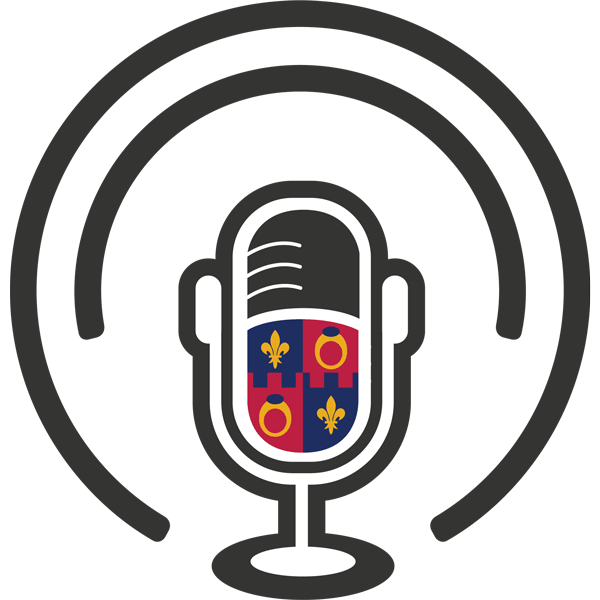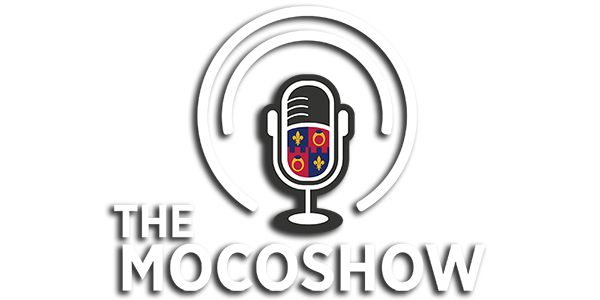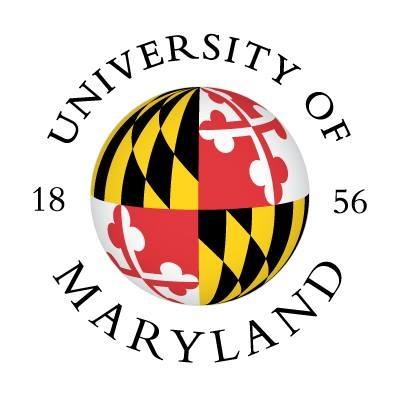
Several Maryland schools were ranked in U.S. News & World Report’s 2022-2023 Best National University list that was released earlier this week. Some of the factors that U.S News uses when compiling the list include graduation and retention rates, faculty resources, “expert opinion”, student excellence, and standardized test results. John Hopkins University (Baltimore) ranked #7, University of Maryland (College Park) #55, University of Maryland Baltimore County #137, and Morgan State University (Baltimore) #317. According to U.S. News, “these rankings and the other school information and data on usnews.com are based on many months of data collection and analysis. The U.S. News Best Colleges rankings expose users to the broad range of four-year degree options available. U.S. News recommends prospective students explore the rankings to create an initial list of schools based on academics, and then use the website’s search tools and data to more closely examine other factors based on their personal priorities and interests.”
National Top Ten:
10. Duke University – Durham, NC
9. California Institute of Technology – Pasadena, CA
7. University of Pennsylvania -Philadelphia, PA, Johns Hopkins University -Baltimore, MD, and University of Chicago
Chicago, IL (3-way tie)
3. Harvard University -Cambridge, MA, Stanford University -Stanford, CA, and Harvard University -Cambridge, MA (3-way tie)
2. Massachusetts Institute of Technology – Cambridge, MA
1. Princeton University -Princeton, NJ
You can see the full list of schools at https://www.usnews.com/best-colleges/rankings/national-universities U.S. News also released lists of the best National Liberal Arts Colleges, Regional Universities and Regional Colleges.
Announcing: U.S. News ranks the Best National Universities for 2022-2023. https://t.co/pC308Ska9D #BestColleges
— U.S. News Education (@USNewsEducation) September 12, 2022
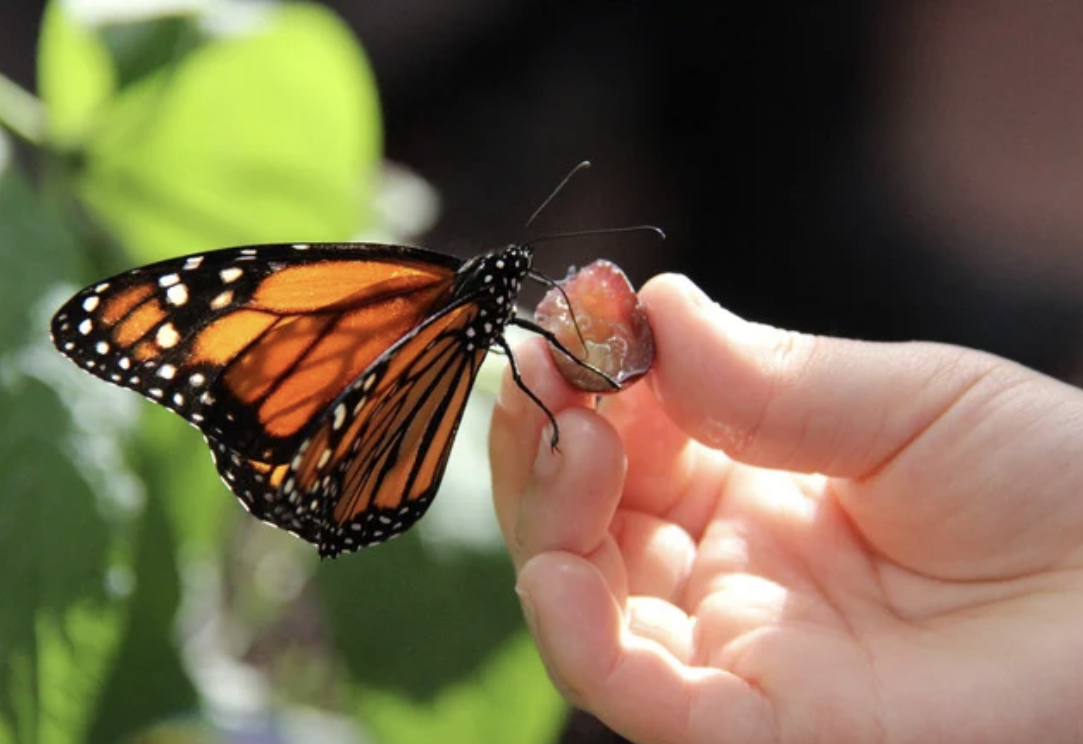
Per the Rotary Club of Gaithersburg:
While the world hopes for an end to the Covid19 Pandemic, Rotary International – a humanitarian service organization dedicated to world peace and understanding – works to make it a reality by providing a place for people to gather outdoors in nature while restoring habitat for the Monarch Butterfly. The Rotary Club of Gaithersburg has provided funding and volunteer hours to assist dedicated teacher, Elizabeth Nardin and her students with a special native outdoor learning space for all to enjoy. Gaithersburg High School Students will Save Monarch Butterflies and improve mental health in their community.
The special needs students in the SCB (School Community Based) program have been working hard creating a garden that is a peaceful place for all students and staff to enjoy while connecting to nature. Students play an important role in maintaining the garden. They have been learning critical life skills and job skills while integrating functional reading and math skills into this year-long project.
They will be able to see the plants come to life this Spring and watch the monarch butterflies, bees, and birds arrive. They will learn the importance of pollinators and begin to understand their life cycles.
The beautiful female Monarch butterfly will lay over 100 eggs on milkweed plants. Caterpillars (Larvae) emerge and eat milkweed leaves as their only source of food. Eventually the caterpillars grow large enough to form a chrysalis and an adult monarch butterfly emerges from it. Most of these Monarchs will join the fall migration to central Mexico and their great grandchildren will return in Spring to the U.S. and Canada. Their population has declined over 90% mostly due to pesticide use. More must be done to restore habitat for our pollinators and preserve beautiful and beneficial insects.
To learn more about the Monarch Sister Schools program, visit www.MonarchSisterSchools.org
To learn more about the Rotary Club of Gaithersburg, visit http://www.gaithersburgrotary.org/
Rotary is an organization of business and professional leaders united worldwide who provide humanitarian service and help to build goodwill and peace in the world. There are approximately 1.2 million Rotarians who are members of more than 34,000 Rotary clubs in over 200 countries. For more information, visit www.rotary.org.
# # #
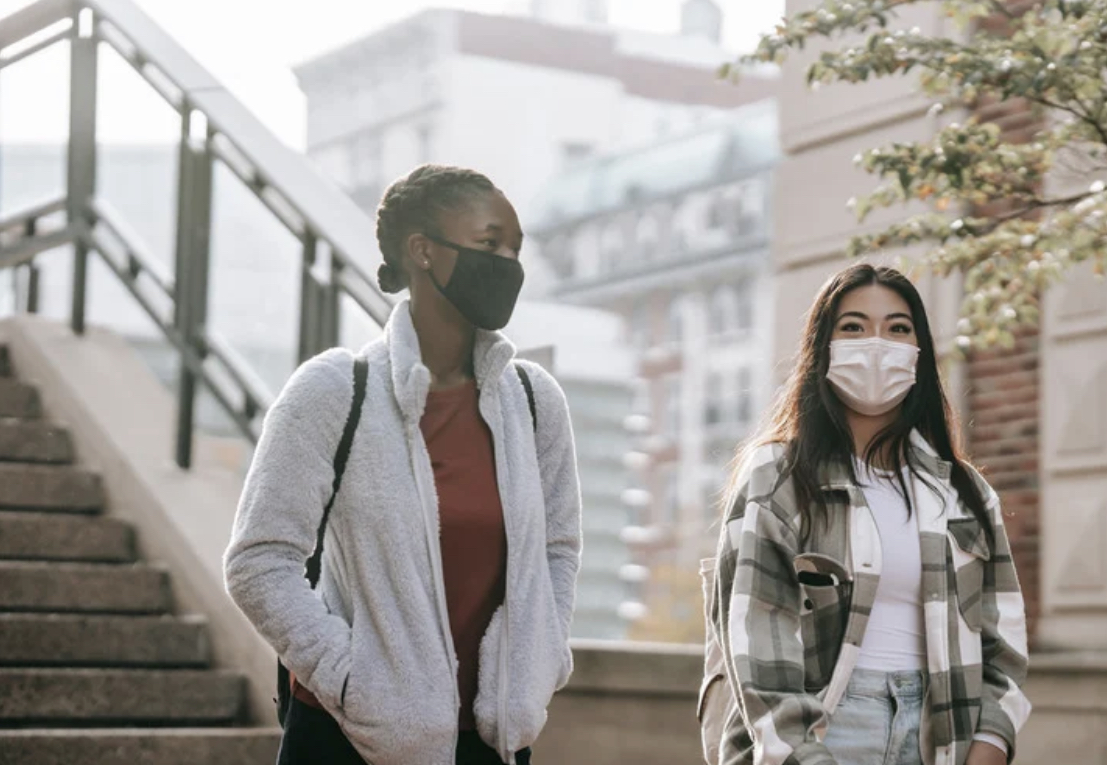
John Hopkins University in Baltimore and Georgetown University in D.C. will both be temporarily reinstating mask mandates due to an increase in COVID-19 cases among students, according to WTOP.
According to the report, the indoor mask requirement goes into effect today, April 7, on the Main and Medical Center campuses at Georgetown.
At Johns Hopkins, masks will be required in all classrooms, as well as in common areas of residence and dining halls.
Georgetown students will also need to take a PCR test after Easter break the week of April 18, unless they have tested positive within the previous 90 days.
John Hopkins will be moving to twice-weekly testing for all undergraduate students for at least this week and the next two weeks (through April 22). The school will then re-evaluate and determine whether the increased testing remains necessary.
Full statements from Georgetown University and John Hopkins below:
Georgetown University:
We are temporarily reinstating an indoor mask requirement for the Main and Medical Center campuses, beginning Thursday, April 7. Please also see information below regarding COVID-19 testing and isolation procedures for undergraduate students.
We are taking these steps in response to a significant increase in COVID-19 cases on the Main Campus and Medical Center campuses this week, particularly among undergraduate students. We have not seen a comparable increase in cases on the Law Center campus. Thankfully, with the vast majority of our community up to date on vaccination, we are not seeing cases involving severe illness.
This increase is partly due to the impact of the BA.2 Omicron subvariant. BA.2 is now the dominant strain in the United States, including in DC and on our campuses. While recent studies show that BA.2 does not cause more severe illness than the initial Omicron variant, they also show that BA.2 is even more transmissible.
These circumstances present a challenge, but we have learned to adjust our mitigation measures to respond to changing conditions throughout the pandemic. Another adjustment is needed now to curb transmission on campus.
Temporary Reinstatement of Indoor Mask Requirement
Beginning Thursday, April 7, everyone will need to wear a mask indoors on the Main and Medical Center campuses, except when in their personal residence or private office or while actively eating or drinking. This requirement will be in effect until further notice.
We strongly recommend wearing a properly-fitting, high-quality mask (e.g., N95, KN95), which are available for free on campus. We also strongly recommend that all members of our community wear a mask when attending indoor social gatherings and events off campus as well.
In the March 18 message, we shared that the University’s mask-optional policy is contingent on public health conditions and that we may need to reinstate the indoor mask requirement or other restrictions for short periods.
We will continue to monitor campus case numbers and positivity rates, COVID-19 community levels in DC and nationally, and global developments relating to the pandemic, which will inform our decision of when to resume the mask-optional policy.
COVID-19 Testing
All undergraduate students will need to take a PCR test after Easter break the week of April 18, unless they have tested positive within the previous 90 days. Please schedule your test in advance via the One Medical app or website. If you get tested through a third-party provider (i.e., not One Medical), please report your result through the COVID-19 Test Result Submission form.
If you have been exposed to anyone with a known COVID-19 infection, please get tested on day 5 following your exposure.
Please also get tested when selected to participate in the University’s random asymptomatic testing.
Isolation Procedures for Undergraduate Students
We are nearing full capacity at our campus hotel and have secured additional isolation space at a nearby hotel.
Residential students who test positive may need to share a hotel room or isolate in their campus residence, which means that COVID-positive and negative students may need to be housed together in the same room or apartment.
Students who test positive who prefer to isolate at home may travel home by private transportation, wearing a properly-fitting, high-quality mask (e.g., N95, KN95) while in a vehicle with others, but should not travel home by public transportation (e.g., plane, train, ride-share).
Symptom Monitoring
As a reminder, please stay home if you have symptoms of COVID-19, except to get tested, and report them to the Public Health team by completing the COVID-19 Symptom Check-In survey.
Dining and Events
We encourage grab-and-go dining and eating in the outdoor tents on campus, whenever possible. Events may continue as planned.
We’ve developed the frequently asked questions below to provide additional information, which we hope you will find helpful.
As we’ve done multiple times before, we will get through this surge together and continue to thrive despite these short-term restrictions.
Sincerely,
Ranit Mishori, M.D., MHS, FAAFP
Professor of Family Medicine, Vice President and Chief Public Health Officer
John Hopkins University:
Dear Undergraduate Students,
Since Spring Break, we have received reports of COVID cases among undergraduates who have recently traveled or who were exposed to someone who has recently traveled. Nearly 100 undergraduate students have reported a positive test since April 1, with cases evenly split among residential and non-residential students. Consistent with what we have seen this term, many students who tested positive are asymptomatic, and the rest are experiencing only mild symptoms.
To help monitor the situation, we are moving to twice-weekly testing for all undergraduate students for at least this week and the next two weeks (through April 22). We will then re-evaluate and determine whether the increased testing remains necessary. We are also temporarily reinstating masking requirements for all people (students, staff, faculty, contractors, visitors, and guests) in common areas of the residence halls and in university dining facilities, except when actively eating or drinking. This is in addition to the required masking in classrooms. The university will continue to provide free, high-quality masks at asymptomatic testing sites.
In order to effectively manage our inventory of off-campus isolation housing, we may also adopt the isolation-in-place protocols outlined in a January message for residential undergraduates. In that case, we would prioritize off-campus isolation housing for residential students most in need, such as those with medical conditions that place them at higher risk from COVID; those who are experiencing more serious presentations of COVID; or those whose living arrangements may make it difficult to isolate (such as students living in doubles as opposed to suites with individual bedrooms). We currently are not accommodating our off-campus COVID-positive students in university isolation housing. However, they should continue to use the resources of Student Health and Wellness and Student Outreach and Support.
If students are asked to isolate in place, they must remain in their rooms and are not to leave unless there is a building or medical emergency. They will have meals delivered to their door, and mail, laundry, and trash removal services will be made available. Isolating students – whether in their rooms or in off-campus housing — are also instructed to communicate with their professors and create plans for handling absences from classes, assignments, and exams.
A member of the COVID Support Team will reach out to you as a follow up to answer any questions or concerns you may have about the isolation process and resources available to you.
We want to assure you that we are taking these precautions so that other students in the university’s residence hall buildings are not put at risk. To help students monitor their own health, we are making self-tests available to all residential students. These tests supplement, but do not replace, the mandatory asymptomatic saliva testing requirements that are in place. Test kits can be picked upfrom 1:30 to 4:30 p.m., Monday through Friday, in the Wolman Housing Office or AMR II Residential Life office.
We appreciate your continued flexibility and will provide to updates as conditions warrant.
Sincerely,
Kevin Shollenberger
Vice Provost for Student Health and Well-Being
Radio station Hot 99.5 (WIHT FM) is running a tournament to determine “Who is the best high school in the DMV?”
Wheaton High School is currently facing off against Osbourn Park High School (Manassas, VA) in the final round.
Voting is currently taking place in Hot 99.5’s Instagram page’s stories. The winning school will be awarded with $1,000.

Northwest (Germantown), Quince Orchard (Gaithersburg), James Hubert Blake (Cloverly), Bethesda Chevy Chase, and Paint Branch (Burtonsville) were all eliminated in earlier rounds of the tournament.
Hot 99.5 (WIHT) broadcasts out of the IHeartMedia studios at 1801 Rockville Pike in Rockville.
Osbourn Park High School in Manassas, VA was the 2021 tournament winner.
DC101, another iHeartMedia station that also broadcasts from the Rockville studio, is currently running a “Best Taco in the DMV” tournament. Tacos Don Perez (Glemont) is currently in the final four.
https://www.instagram.com/p/CbpvvflL7YM/
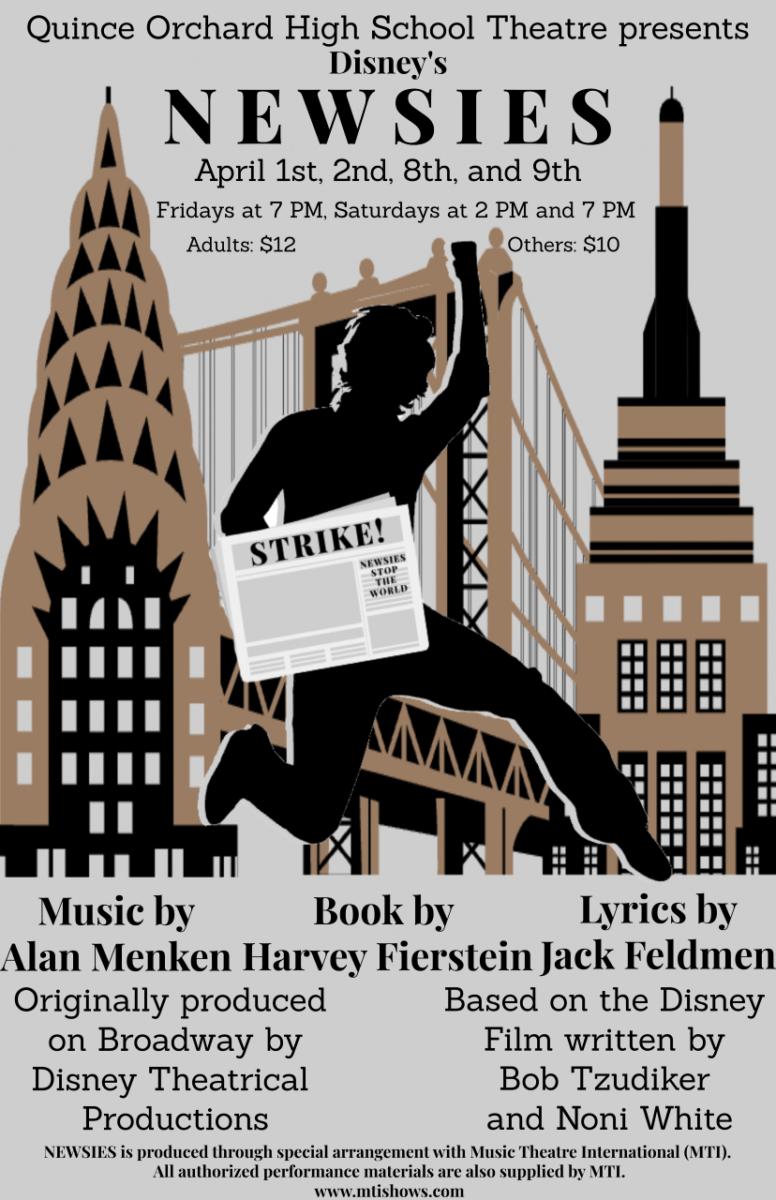
Per Quince Orchard High School:
Performances run April 1st, 2nd, 8th, 9th
GAITHERSBURG, MD – QO Theatre, theatre program of Quince Orchard High School of MCPS, will present its production of Disney’s Newsies, opening April 1st. With a company made up almost entirely of students, including the cast, creative team, crew, and pit orchestra, this production promises to be full of energy and is perfect for the whole family. Performances will run on April 1st, 2nd, 8th, and 9th. Friday performances will begin at 7 PM, and Saturday
performances will begin at 2 PM and 7 PM each day. Tickets can be bought at the door, and cost $12 for adults and $10 for all others. All performances will take place at Quince Orchard High School (15800 Quince Orchard Road, Gaithersburg, MD, 20878). With high caliber dance numbers, incredible set, and remarkable cast, the quality of this production is hard to beat and shouldn’t be missed.
Disney’s Newsies tells the story of the working kids of New York City in 1899, specifically the young kids that worked day after day selling newspapers to anyone that would take them. When New York World editor-in-chief Joseph Pulitzer raises the Newsies’ price for the newspapers, effectively forcing them to sell more newspapers just to earn the same amount, they lead a strike against him and other high-class robber barons to treat their workers humanely and with dignity. Intertwined with this coming-of-age story are high tensions, love ballads, high caliber dance numbers, and more that are sure to have audiences cheering.
QO Theatre is the highly regarded theatrical arts program at Quince Orchard High School. We focus on encouraging our students to explore their interests. Whether that be performance arts, technical theatre, music, direction, or choreography, all students are welcome to pursue their passion. We offer a fun yet professional environment and aim to prepare our students for their future, whether they go into theatrical arts or not. Past productions have included “The 25th Annual Putnam County Spelling Bee,” “Clue,” “Hello, Dolly!,” and “Anything Goes.”
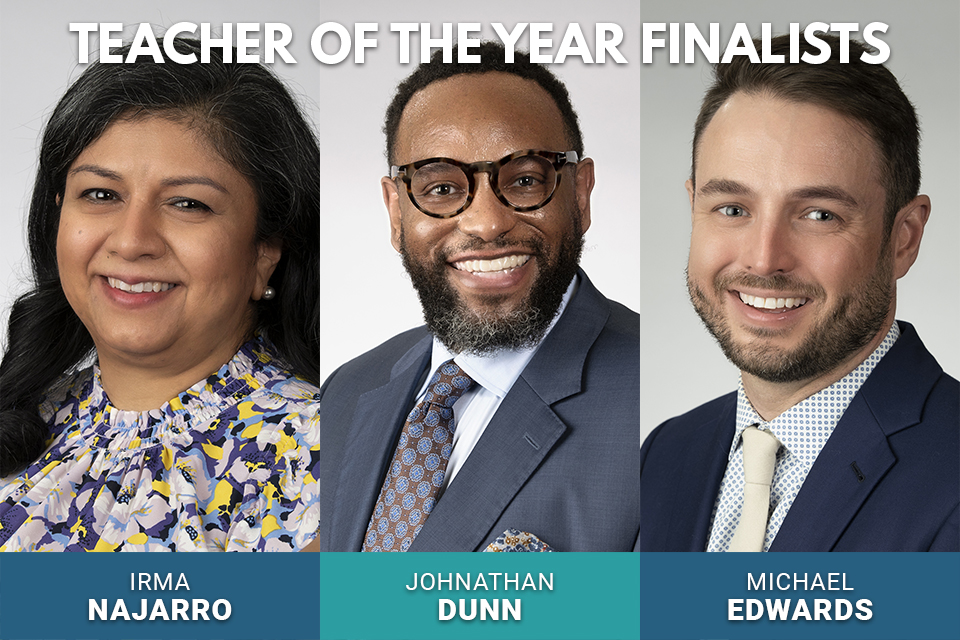
Per Montgomery County Public Schools:
March 16, 2022
Three teachers have been named finalists for the 2022–2023 MCPS Teacher of the Year. They are: Irma Najarro, dual-language fourth grade teacher at Washington Grove Elementary School; Michael Edwards, world studies and global humanities sixth grade teacher at Julius West Middle School; and Johnathan Dunn, choral teacher at Sherwood High School.
Irma Najarro is a fourth grade bilingual teacher at Washington Grove Elementary School. In her 16-year career, she has taught at Washington Grove and South Lake, both Title I schools. Colleagues describe her as a conscientious, patient teacher who infuses socio-emotional skills with compassion and positivity. She works hard to recognize students’ individual needs, encourages their talents and fosters their self-esteem. At Washington Grove, she teaches in Spanish and English, a task that requires content knowledge and the ability to create a learning environment that elevates Spanish while teaching students how to make connections between the two.
Najarro believes that students who feel welcomed, comfortable and cared for will thrive when teachers have confidence that they can accomplish the targeted objectives. Students are encouraged to embrace a growth mindset, to set goals and to understand the reasons behind what they’re being taught. If they understand why, they will develop an intellectual curiosity that helps them develop into lifelong learners. She plans opportunities for students to extend their thinking and productively struggle before she helps them find ways to overcome those obstacles.
As an immigrant herself, she has shared her story of assimilation to a new country, and uses her past experiences to help students overcome their struggles. She has established strong communication skills with parents of her students, reaching out to them in multiple ways—Class Dojo, emails, calls and newsletters.
Najarro motivates new educators to help mold the next generation, has been part of many committees working to improve school climate and morale, and has led training sessions on equity. During her years teaching at South Lake, she served as the chair for Hispanic Heritage Night and Career Day, and helped establish after-school and summer clubs.
She is a member of the School Improvement Team, served as the school’s Elected Faculty Member and, for eight years, has served as team leader, guiding new and experienced teachers. She also serves as a PTA co-cluster coordinator for the Gaithersburg cluster. She holds a master’s degree from Johns Hopkins University.
— Ms. Najarro “has taught me that studying and listening [are] important to succeed in life,” wrote one of her fourth grade students. “When I’m sad, she always asks if I’m okay, and she helps me feel better.”
Michael Edwards has taught sixth grade world studies and global humanities at Julius West Middle School since 2019. Known for his ability to connect with students, Edwards is a popular, caring and open-minded educator who shows empathy and listens to all points of view.
He coordinates the school’s restorative justice and the No Place for Hate (NPFH) programs, which both incorporate strategies to proactively build a positive school culture. He has been instrumental in creating lesson plans that educate students on the impact of racial and ethnic slurs and gender identity issues, as well as the importance of respect and tolerance for all. He routinely signs up for professional growth classes on restorative justice, and has facilitated sessions for staff. His efforts extend into the larger community. During the pandemic, along with the Julius West NPFH committee, Edwards organized a food drive for families in need, collecting more than 350 bags of food, and distributed mental health supplies, including calming strips, stress balls and mindfulness activities.
Edwards is a leader in the sixth grade social studies Professional Learning Community (PLC), advocating for using new technologies and incorporating school improvement plan initiatives, such as higher-order questioning, active classroom and student discourse into curriculum. He uses modified instructional materials for struggling learners, such as content readings by lexile level and sentence frames, while maintaining challenge and rigor for higher-level learners.
Edwards is beloved because he makes history exciting and interesting, creating lessons that are relatable and providing real-world connections. He holds weekly one-on-one meetings with students about grades and work completion, and provides consistent feedback. He asks them to set personal and class goals, and encourages them to achieve at a high level. He creates positive relationships with them, so they feel comfortable taking risks, one of the key tenets of the International Baccalaureate (IB) program.
A Paint Branch high school graduate and the son of a teacher, Edwards is the school’s junior varsity soccer coach, and has also served as a swim and soccer coach for other schools and clubs. He previously taught sixth grade at Thomas W. Pyle Middle School, and holds a master’s degree in educational leadership.
— “Mr. Edwards changes lives for the better,” said a seventh grade student. “He does not shut down anyone’s opinions or thoughts. He boosts students’ confidence and makes them feel special when school can be challenging.”
Johnathan Dunn has been a choral teacher at Sherwood High School for nine years. He is the kind of teacher who shapes students’ academic experience. He brings positive energy, love and kindness to everyone he encounters. A joyful and enthusiastic educator, Dunn works tirelessly to see that his students benefit from his lessons.
He teaches chorus, piano and music perspectives. Believing that music is a way to connect, he makes the music department a home for everyone. He takes great pride in making sure that all students have an opportunity to express themselves and experience the joy of music, regardless of their background, physical capabilities, learning differences, mental health challenges or musical proficiency. He encourages them all to perform in concerts and get involved in the Rock n‘ Roll Revival production, a 50-year tradition at Sherwood. With a cast of more than 300 students—from the highly skilled to first-time performers—Dunn unites them for a creative three-hour show. He also leads other school events, including vocal direction for the fall musical production and the Night of Jazz event in the spring.
He has coordinated teacher- and parent-led educational sightseeing and musical theater trips for chorus students to New York City. He has an open-door policy, and students regularly visit to talk with him about academic struggles or other concerns.
Outside school, Dunn contributes his time to community events, and is active as a leader in music ministry and worship. A graduate of Catholic University, Dunn is a composer, arranger and pianist whose career began as an aspiring concert pianist. He has served as artistic director for the Washington Youth Choir. A finalist in the National Symphony Young Soloists’ Competition in 1993, he performed the Grieg Piano Concerto at the John F. Kennedy Center for the Performing Arts.
Dunn is also restorative justice coach at the school, and in the 2020–2021 school year, took on an administrator position responsible for the ninth grade. He is in his final semester of graduate studies at Hood College, earning a master’s degree in educational leadership. In his 19 years with MCPS, he has been a choral educator at James Hubert Blake High School, Cabin John Middle School and Francis Scott Key Middle School.
— “When I had Mr. Dunn, I always left school feeling more inspired—and more self-confident,” said former student James Fitzgerald.
The winner, who will be announced during a virtual celebration on April 28, will go on to compete for Maryland Teacher of the Year honors.
The “Once Upon A Prom” club will be holding a prom dress giveaway on Friday, April 1 at Bethesda Chevy Chase Highschool (4301 East-West Hwy) from 12-6pm.
The club, which is run by BCC High School sophomores Brooke Silver and Anna Antinolfi, is currently in its 12th year. It was started by the second oldest of six sisters, Carly Silver, who then passed the baton to her next oldest sister, Peyton, who, in turn, passed it to her next oldest sister, Madison—-and the continuum has played out through all six sisters.
This year the group has over 2,000 dresses they are looking to donate to underprivileged and under-resourced girls in the area.


The winners have been announced of the Montgomery County Department of Transportation’s “Heads Up, Phones Down” high school video contest.
Montgomery County teens were asked to create videos to encourage peers not to allow cell phones to distract them while driving and walking. Prizes included a PS5, an Apple Watch, and Amazon gift cards.
Winners videos below:
Individual Winners
-
Group Winners
-
Grand PrizeWinner: Mohit B.Group Members: Ryan N., Agustin S., Aniket B.School: Clarksburg High SchoolTitle: Love Can Wait
-
First Runner UpWinner: Alexander R.Group Members: Nicholas B., Julian E.School: Montgomery Blair High SchoolTitle: Don’t be like Josh
The Prizes
Individual Prizes
Grand Prize – PS5
1st Runner Up – Apple Watch
2nd Runner Up – Tripod for Mobile Phone
People’s Choice – $100 Nike Gift Card
Group Prizes (shared by up to 4 team members)
$800 in Amazon Gift Cards
$400 in Amazon Gift Cards
$200 in Amazon Gift Cards
$100 Nike Gift Card (per team member)

Effective February 25, 2022, CDC does not require wearing of masks on buses or vans operated by public or private school systems, including early care and education/child care programs.
Effective February 25, 2022, CDC is exercising its enforcement discretion to not require that people wear masks on buses or vans operated by public or private school systems, including early care and education/child care programs. CDC is making this change to align with updated guidance that no longer recommends universal indoor mask wearing in K-12 schools and early education settings in areas with a low or medium COVID-19 Community Level. School systems at their discretion may choose to require that people wear masks on buses or vans.
Earlier today, MCPS sent out a message stating that “it is anticipated that the Montgomery County Board of Education, at its March 8 business meeting, will vote to make masks optional in MCPS facilities.” The decision for buses may also be made at that time.
Full update from the CDC:
Traveling on public transportation increases a person’s risk of getting and spreading COVID-19 by bringing people in close contact with others, often for prolonged periods, and exposing them to frequently touched surfaces. Air travel often requires spending time in security lines and busy airport terminals. Travel by bus, train, and other conveyances used for international, interstate, or intrastate transportation poses similar challenges. Staying 6 feet away from others is often difficult on public transportation conveyances. People may not be able to distance themselves by the recommended minimum of 6 feet from other people seated nearby or from those standing in or passing through the aisles on airplanes, trains, or buses.
Travel contributes to interstate and international spread of COVID-19. Wearing masks that completely cover the mouth and nose reduces the spread of COVID-19. People who never develop symptoms (asymptomatic) or are not yet showing symptoms (pre-symptomatic) might not know that they are infected but can still spread COVID-19 to others. Masks also offer protection to the wearer.
On January 29, 2021, CDC issued an Order that required face masks to be worn by all people while on public transportation (which included all passengers and all personnel operating conveyances) traveling into, within, or out of the United States and U.S. territories. The Order also required all people to wear masks while at transportation hubs (e.g., airports, bus or ferry terminals, train and subway stations, seaports, U.S. ports of entry, and other locations where people board public transportation in the United States and U.S. territories), including both indoor and outdoor areas.
Effective February 25, 2022, CDC is exercising its enforcement discretion to not require that people wear masks on buses or vans operated by public or private school systems, including early care and education/child care programs. CDC is making this change to align with updated guidance that no longer recommends universal indoor mask wearing in K-12 schools and early education settings in areas with a low or medium COVID-19 Community Level. School systems at their discretion may choose to require that people wear masks on buses or vans.
CDC previously announced that it would use enforcement discretion to not require people to wear a mask in outdoor areas of conveyances (if such outdoor areas exist on the conveyance) or while outdoors at transportation hubs. CDC will continue to evaluate the requirements of its Order and determine whether additional changes may be warranted.
While in indoor areas of conveyances or while indoors at transportation hubs, people are not required to wear a mask under the following circumstances:
- while eating, drinking, or taking medication for brief periods of time;
- while communicating for brief periods of time with a person who is hearing impaired when the ability to see the mouth is essential for communication;
- if, on an aircraft, wearing oxygen masks is needed because of loss of cabin pressure or other event affecting aircraft ventilation;
- if unconscious (for reasons other than sleeping), incapacitated, unable to be awakened, or otherwise unable to remove the mask without assistance;
- when necessary to temporarily lower or remove the mask to verify one’s identity such as during Transportation Security Administration (TSA) screening or when asked to do so by the ticket or gate agent or any law enforcement official;
- when experiencing difficulty breathing or shortness of breath or feeling winded, until able to resume normal breathing with the mask; when vomiting until vomiting ceases; or if wearing a mask interferes with necessary medical care such as supplemental oxygen administered via an oxygen mask.
The following categories of people continue to be exempt from the requirement to wear a mask:
- A child under the age of 2 years;
- A person with a disability who cannot wear a mask, or cannot safely wear a mask, because of the disability as defined by the Americans with Disabilities Act (42 U.S.C. 12101 et seq.);
- A person for whom wearing a mask would create a risk to workplace health, safety, or job duty as determined by the relevant workplace safety guidelines or federal regulations.
People on board the following categories of conveyances continue to be exempt from the requirement to wear a mask:
- Private conveyances operated only for personal, non-commercial use;
- Commercial motor vehicles or trucks, if the driver is the only person in the vehicle or truck, or the vehicle or truck is operated by a team who all live in the same household and are the only persons in the vehicle;*
- Conveyances operated or chartered by the U.S. military as long as the operator of the conveyance follows all requirements of U.S. military services to prevent spread of COVID-19 that are equivalent to the requirements in CDC’s Order.
*Non-passenger-carrying commercial vessels operated by a team of mariners who all live on the vessel and are the only people on the vessel are also permitted to use this exemption.
Frequently Asked Questions
General
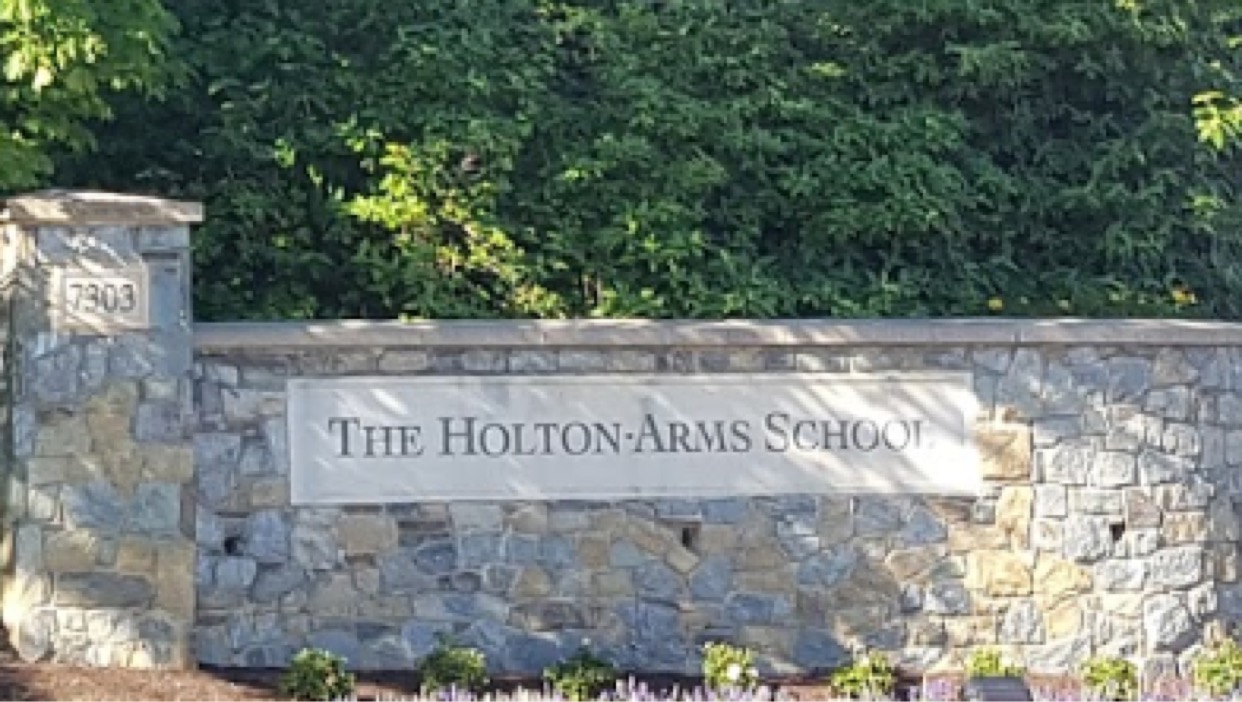
Montgomery County Police responded to a “domestic related event” this morning around 11am at the Holton Arms School at 7303 River Rd. in Bethesda. The private school was placed on lockdown while the situation was handled by police.
A suspect is now in custody and the school is no longer on lockdown, according to a tweet by MCPD. This is an active and ongoing investigation.
Chief Spokesperson for Montgomery County Fire and Rescue Pete Piringer reports that a pedestrian was struck in front of Holton Arms School at 11am this morning and that one person was transported with priority 1 injuries and another with priority 3 injuries. There is no word on whether the two incidents that occurred at the school the school this morning are related.
Update – River Rd., ISO Holton Arms School, pedestrian struck, @MCFRS_EMIHS transported 1 Pri2 & 1 Pri3 adult, police on scene https://t.co/syeyum6RWX
— Pete Piringer (@mcfrsPIO) February 15, 2022
The Holton-Arms School is an independent college preparatory school for girls in grades 3-12. The school was founded in 1901 in Washington, DC, and moved to its current location on River Rd. in 1963.
We will provide an update when more information becomes available.
At ~10:59 a.m. today, MCPD responded to Holton Arms School on River Road for a domestic related event. The school was placed in lockdown.
Suspect has been taken into custody by MCP. The school is no longer on lockdown.
This is an active and ongoing investigation.
— Montgomery County Department of Police (@mcpnews) February 15, 2022
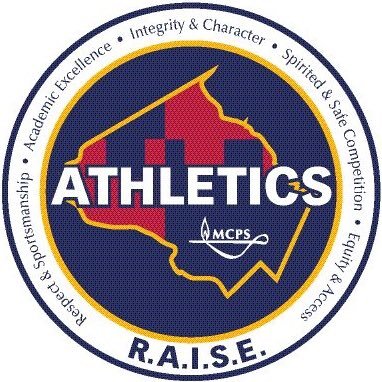
On Friday, MCPS sent out a community messaging announcing that MCPS in now accepting religious exemptions to their COVID-19 vaccine requirement for student athletes. They cite the decreasing COVID-19 transmission rate as well as the high vaccination rate in Montgomery County as the reason for their decision.
Full message below:
Dear MCPS Community:
Thank you for your continued support of MCPS Athletics, as we navigate the ever-changing challenges and dynamics of COVID-19. Here are some important program updates and reminders:
Religious Exemptions – COVID-19 Vaccination Requirement
In alignment with CDC guidance, MCPS is now accepting requests for religious exemptions because of the decreasing COVID-19 community transmission rate, coupled with Montgomery County’s high vaccination rate. This updated process begins with the Spring 2022 season – registration is now open.
Religious and medical exemptions are submitted using MCPS Form 560-30A, which is also available in Spanish.
Spectator Restrictions
The number of ticketed spectators at contests in MCPS facilities remains at 50% of facility capacity. While capacity restrictions are in place, please note the following:
● Tickets will be made available through GoFan digital ticketing at 12:00 noon on game day. For games with anticipated larger crowds, tickets will be available to families of participating student-athletes first through a presale (time communicated between the participating schools). A maximum of four tickets per transaction will be allowed.
● MCPS and MPSSAA passes, season tickets, and MCPS staff admission will be honored.
● Spectators and school operations will align with the Winter 2021–22 Spectator and Game-Day Guidelines.
● For non-MCPS facilities, operations will comply with the procedures and protocols of the host facility and/or jurisdiction.
● For swimming and diving meets, attendance will be limited to two spectators per student-athlete, if facilities allow.
● There are no capacity limitations for outdoor competitions.
● Gymnasium events will continue to be streamed through the NFHS Network.
Spring Registration
Registration for high school spring sports and out-of-season conditioning is open through ParentVue! The first day of the spring sports season is Tuesday, March 1. Only students who have completed the registration process, which includes submitting verification of vaccination or exemption, and meet all other eligibility requirements, will be eligible to tryout and participate.
Overnight Travel
All overnight travel is canceled through February 17. Overnight trips may resume beginning February 18.
Winter Postseason
The winter postseason continues this week – the schedule is here! More detailed information regarding postseason events can be found on the MCPS and MPSSAA websites. Updates will be provided on an ongoing basis.
NFHS Network
Contests in stadiums and main gymnasiums will continue to be broadcast live on the NFHS Network. Parents and fans can subscribe to the network and have access to all games for a monthly subscription of $10.99/month (or yearly pass for $69.99/year). All games are free after 72 hours. Information regarding programming is provided by local schools.
Middle School Athletics
Middle school basketball schedules are available here. Any potential rescheduling of middle school contests impacted by COVID-19 will continue to be coordinated through league coordinators and the Athletics Unit.
Registration for middle school spring sports (boys’ and girls’ soccer) will open through ParentVue on Monday, February 14, 2022. The first day of the spring sports season is Tuesday, March 8. Only students who have completed the registration process, which includes submitting verification of vaccination or exemption, and meet all other eligibility requirements, will be eligible to tryout and participate.
Return to R.A.I.S.E. Plan Operations
The Return to R.A.I.S.E. Plan will continue to drive program operations in regard to COVID-19 procedures and protocols. The plan is reviewed on an ongoing basis by the COVID-19 Task Force for MCPS Athletics. The latest version is always available on the COVID-19 Athletics Information webpage.
Communication and Resources
Our COVID-19 Task Force for MCPS Athletics will continue to evaluate and implement the latest safety measures. Updates and guidance from the Task Force will continue to be provided and are available on the COVID-19 Athletics Information webpage. Specific questions should be directed to your school’s athletics specialist (AD), athletic coordinator (AC), or coach.
We appreciate your continued commitment and support of our student-athletes and MCPS Athletics!
Montgomery County Public Schools
